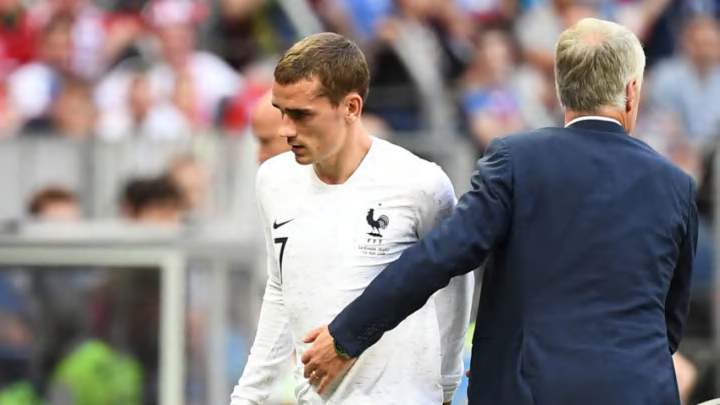France finished top of Group C, but still haven’t fully convinced. Didier Deschamps has work to do.
Not many teams came into this World Cup with more talent and depth than France. They have a squad with every type of player that can fill any role, as well as backups capable of starting for them on any given day. Yet for all the talent at his disposal, manager Didier Deschamps seems adamant about molding the team in his image: A no-nonsense defensive unit doing just enough to grab results.
France opened Group C with a narrow 2-1 win over Australia. History was made as they earned the first penalty given following a VAR review at a World Cup, converted by Antoine Griezmann, but after Mile Jedinak equalized, Les Bleus needed an own goal to get the win.
Not exactly the most glamorous way to start a tournament. Deschamps went with a 4-3-3 system involving Ousmane Dembele and Kylian Mbappe on the wings with Griezmann up top for that game. The passing wasn’t sharp, ball movement wasn’t fast enough and on came Olivier Giroud and Nabil Fekir to improve things. Giroud was involved in the build-up to the game-winner, and was rewarded with a start against Peru in their next group stage game.
Deschamps changed the system to a 4-2-3-1, using Paul Pogba and N’Golo Kante in a double pivot, with Giroud up top and Griezmann playing behind him. Strangely, he inserted Blaise Matuidi on the left flank instead of dribbling wizards like Dembele or Thomas Lemar. The result was a futile attack going down Matuidi’s side, but a more threatening team on the counter-attack.
Mbappe scored the winner, making him the youngest French goalscorer at a World Cup in a slim 1-0 win over Peru. A better performance compared to the one against Australia? Sure, but still, something isn’t clicking with the attack. Pogba is restricted, while their build-up play still lacks creativity and fluidity in midfield. The one constant is the defense doing just enough to grind out results.
But let’s not kid ourselves, this back line hash’t covered itself in glory either. Samuel Umtiti was punished for a silly handball against Australia, while he and Raphael Varane have both been caught out of position by opposing strikers. They haven’t been convincing, and neither have the full-back pairing of Lucas Hernandez and Benjamin Pavard, who are fine at the back but offer very little going forward.
It’s clear Deschamps favors this pair over the more thrilling duo of Benjamin Mendy and Djibril Sidibe. And that can only lead to what the man in charge wants, a well-drilled side that’ll sacrifice beautiful attacking play for winning games, a la Fernando Santos, whose Portugal side took European glory against Deschamps on French soil in 2016. It wasn’t pretty then, and it’s not pretty now.
Next: The best player on every team at the World Cup
In their last group stage game against Denmark, Deschamps made multiple changes to his starting XI and rested key starters. Despite this, their overall play was disjointed and lacking in attacking intent. It yielded the first scoreless draw of the tournament, something Deschamps didn’t mind despite comments made in the lead-up to this game by Denmark boss Age Hareide.
In a tournament where other favorites, Germany and Spain most notable, have been exposed in transition as a result of their commitment to throwing bodies forward in attack, it’s understandable, to an extent, that Deschamps has set his team up the way he has.
Even so, what everyone is waiting from France is a performance that wows us — lovely attacking play with flair and swagger. So far we haven’t witnessed anything close to that, just a team that has squeaked by while not looking great in doing so. The problem with such an approach is that it is only justifiable if it brings success. If France don’t aspire to anything more heading into the knockout rounds, and go out playing the same bland style of soccer, Deschamps will bear the blame. Deservedly so.
